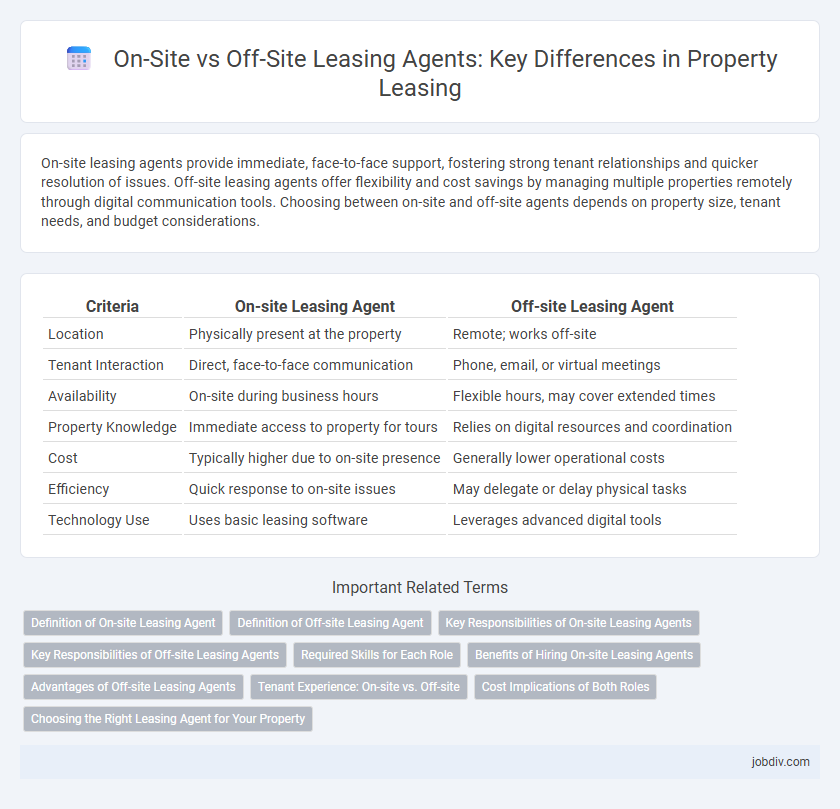On-site leasing agents provide immediate, face-to-face support, fostering strong tenant relationships and quicker resolution of issues. Off-site leasing agents offer flexibility and cost savings by managing multiple properties remotely through digital communication tools. Choosing between on-site and off-site agents depends on property size, tenant needs, and budget considerations.
Table of Comparison
| Criteria | On-site Leasing Agent | Off-site Leasing Agent |
|---|---|---|
| Location | Physically present at the property | Remote; works off-site |
| Tenant Interaction | Direct, face-to-face communication | Phone, email, or virtual meetings |
| Availability | On-site during business hours | Flexible hours, may cover extended times |
| Property Knowledge | Immediate access to property for tours | Relies on digital resources and coordination |
| Cost | Typically higher due to on-site presence | Generally lower operational costs |
| Efficiency | Quick response to on-site issues | May delegate or delay physical tasks |
| Technology Use | Uses basic leasing software | Leverages advanced digital tools |
Definition of On-site Leasing Agent
An on-site leasing agent is a property professional who works directly at the rental location, managing daily operations such as showing units, processing applications, and facilitating tenant communications. This agent acts as the primary point of contact for prospective and current residents, ensuring immediate support and personalized service. On-site presence enhances responsiveness and fosters stronger community relationships within the property.
Definition of Off-site Leasing Agent
An Off-site Leasing Agent manages property leasing activities remotely, handling tenant inquiries, lease agreements, and application processes without being physically present at the property location. This agent relies heavily on digital communication tools such as phone calls, emails, and virtual tours to engage prospective tenants and facilitate leasing transactions. Off-site leasing agents optimize operational efficiency by supporting multiple properties from a centralized office, reducing the need for on-site staff and enabling scalable property management.
Key Responsibilities of On-site Leasing Agents
On-site leasing agents directly manage property showings, tenant inquiries, and lease signings, providing immediate support and personalized service to prospective and current tenants. They oversee maintenance coordination and ensure compliance with property rules, facilitating prompt resolution of tenant issues. Their presence on the property enhances community engagement and strengthens landlord-tenant relationships through consistent face-to-face interaction.
Key Responsibilities of Off-site Leasing Agents
Off-site leasing agents primarily focus on managing leasing inquiries, conducting online tours, and processing applications remotely, leveraging digital tools to enhance efficiency. They coordinate with on-site staff to ensure accurate property information and timely follow-ups with prospective tenants. Their role emphasizes virtual communication, marketing outreach, and administrative tasks to streamline the leasing process without a physical presence on property grounds.
Required Skills for Each Role
On-site leasing agents require strong interpersonal skills, deep property knowledge, and the ability to conduct walkthroughs, respond to tenant inquiries, and handle immediate leasing issues effectively. Off-site leasing agents need excellent communication skills, proficiency with digital leasing platforms, and the ability to manage multiple property listings remotely while providing virtual tours and timely follow-ups. Both roles demand negotiation expertise and a thorough understanding of leasing laws and market trends to secure tenants efficiently.
Benefits of Hiring On-site Leasing Agents
On-site leasing agents provide immediate, personalized service to prospective tenants, enhancing tenant experience and increasing lease conversion rates. Their constant presence allows for rapid property showings, maintenance issue reporting, and direct communication with residents, which improves tenant retention. Employing on-site agents can lead to higher occupancy levels and streamlined property management compared to off-site leasing options.
Advantages of Off-site Leasing Agents
Off-site leasing agents offer greater flexibility by handling leasing tasks remotely, reducing the need for dedicated office space and cutting operational costs. They can efficiently manage multiple properties across different locations, leveraging digital tools to streamline tenant communications and application processes. This approach enhances scalability and responsiveness, ultimately improving the leasing experience for both property owners and prospective tenants.
Tenant Experience: On-site vs. Off-site
On-site leasing agents provide immediate, personalized service and foster stronger tenant relationships by being physically present for walkthroughs, maintenance requests, and community events, enhancing tenant satisfaction. Off-site leasing agents manage multiple properties remotely, which may reduce response times and limit face-to-face interactions, potentially impacting the tenant's sense of connection and support. Tenants often prefer on-site agents for quicker resolution of issues and a more engaging leasing experience, especially in multifamily housing communities.
Cost Implications of Both Roles
On-site leasing agents typically incur higher direct costs due to salaries, benefits, and workspace expenses within the property, but they can enhance lease conversions through immediate availability and personalized service. Off-site leasing agents reduce overhead by working remotely, often leveraging digital tools to manage multiple properties simultaneously, resulting in lower fixed costs but potentially less tenant engagement. Evaluating these cost implications helps property managers balance budget constraints with leasing effectiveness to optimize financial performance.
Choosing the Right Leasing Agent for Your Property
Selecting the right leasing agent for your property hinges on your management priorities and tenant interaction needs. On-site leasing agents offer immediate responsiveness and personalized tenant engagement, often boosting resident satisfaction and retention rates. Off-site leasing agents provide broader market reach and flexible availability, leveraging digital tools to efficiently handle inquiries and applications across multiple properties.
On-site Leasing Agent vs Off-site Leasing Agent Infographic

 jobdiv.com
jobdiv.com